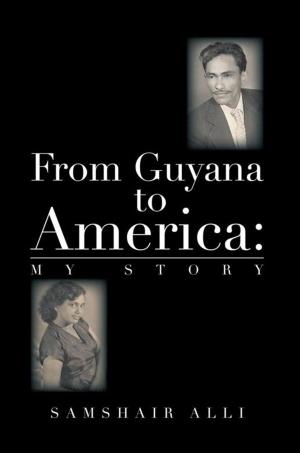| Author: | Marguerite Thoburn Watkins | ISBN: | 9781462839940 |
| Publisher: | Xlibris US | Publication: | October 22, 2004 |
| Imprint: | Xlibris US | Language: | English |
| Author: | Marguerite Thoburn Watkins |
| ISBN: | 9781462839940 |
| Publisher: | Xlibris US |
| Publication: | October 22, 2004 |
| Imprint: | Xlibris US |
| Language: | English |
Marguerite Thoburn Watkins memoir, Two Taproots: Growing Up in the Forties in India and America begins as the USA enters World War II and her missionary family, the Thoburns, is evacuated from India to America. It covers the next ten years of the authors life. Three peripatetic years in New England with their wartime scrap drives, rationing and victory gardens, culminated in a precipitous return to India while the war was still on. The departure was secret because, Loose lips sink ships. She is back in India for Indian independence, the partition riots and the assassination of Gandhi.
But the story is primarily personal -- family, friends, boarding school life, experiences and impressions of growing up in two worlds. It is about formative years shaped by World War II, the last days of the British Raj, Indian independence, and by missionary life. The author was a professors kid on an Indian college campus and an American girl at boarding school in the Himalayas. Nourished, as she says, by English khana and Hindustani gana, by a rich stew of cultures and religions, and by the natural beauty of her homes, she describes herself as having two taproots, India and America. But she was also part of a third experience that was nourished by both countries, a third culture kid. She conveys the privilege, and challenge, of such a life, discovering, as do many expatriate children, that her country of citizenship seemed sometimes more foreign than the land in which she was born and that she is both at home and a stranger in either world.
The authors great love for India is apparent. As a writer," she says, "I can put myself back into a picture and am surrounded by the sounds, smells, people, names I thought I had forgotten. Like shifting color chips in a kaleidoscope, forgotten patterns regroup and are mine again for a moment.
The ongoing struggle for self-rule was a feature of her landscape in both Jabalpur and Mussoorie -- obstacle after obstacle, marches, arrests. When independence finally arrived, it came with a joyous rush but it came with partition, and the bloody partition rioting. The author writes:
Suddenly we too were involved, and the Landour Muslims were in harms way. One particular night toward the end of August, students heard shouts and screams from the hillside across the valley, a sobering experience. Partition rioting had started in Mussoorie. Standing on the balcony in the afternoons, looking toward the Landour bazaar, girls watched the rioting far across the valley. We had a panoramic view of the Mullingar army headquarters on the ridge and below it the settlement of Muslim homes. We observed ant-like figures climb toward the safety of the Mullingar enclosure. To our horror, columns of smoke rose from burning homes. The flames from one large house lit the sky. Yet there was an eerie unreality to the scene; it was all so far away. We could see the destruction, but it was too far to hear very much. And too, we now had no news from the outside world, and little sense of how widespread and bloodthirsty the riots had become.
Finally it was time for the author to sail back to America to attend Bates College in Maine. It was the end of her childhood. The memoir closes as a new decade begins, New Years Day 1950. It was the start of her next incarnation, life at home in her country of citizenship.
I snuggled in, longing for my cat, and looked out the window at the snow and stars. In a few hours it would be New Years Day, 1950. I wondered what the new decade would bring me. And I thought about my two lives, the unknown one ahead in this home country that was not really home, where I felt like an outsider, and the one behind me in the country I loved, where I really was an outsider but did not feel like one. I had friends at college and family here who loved me but did not understand me. I thought about
Marguerite Thoburn Watkins memoir, Two Taproots: Growing Up in the Forties in India and America begins as the USA enters World War II and her missionary family, the Thoburns, is evacuated from India to America. It covers the next ten years of the authors life. Three peripatetic years in New England with their wartime scrap drives, rationing and victory gardens, culminated in a precipitous return to India while the war was still on. The departure was secret because, Loose lips sink ships. She is back in India for Indian independence, the partition riots and the assassination of Gandhi.
But the story is primarily personal -- family, friends, boarding school life, experiences and impressions of growing up in two worlds. It is about formative years shaped by World War II, the last days of the British Raj, Indian independence, and by missionary life. The author was a professors kid on an Indian college campus and an American girl at boarding school in the Himalayas. Nourished, as she says, by English khana and Hindustani gana, by a rich stew of cultures and religions, and by the natural beauty of her homes, she describes herself as having two taproots, India and America. But she was also part of a third experience that was nourished by both countries, a third culture kid. She conveys the privilege, and challenge, of such a life, discovering, as do many expatriate children, that her country of citizenship seemed sometimes more foreign than the land in which she was born and that she is both at home and a stranger in either world.
The authors great love for India is apparent. As a writer," she says, "I can put myself back into a picture and am surrounded by the sounds, smells, people, names I thought I had forgotten. Like shifting color chips in a kaleidoscope, forgotten patterns regroup and are mine again for a moment.
The ongoing struggle for self-rule was a feature of her landscape in both Jabalpur and Mussoorie -- obstacle after obstacle, marches, arrests. When independence finally arrived, it came with a joyous rush but it came with partition, and the bloody partition rioting. The author writes:
Suddenly we too were involved, and the Landour Muslims were in harms way. One particular night toward the end of August, students heard shouts and screams from the hillside across the valley, a sobering experience. Partition rioting had started in Mussoorie. Standing on the balcony in the afternoons, looking toward the Landour bazaar, girls watched the rioting far across the valley. We had a panoramic view of the Mullingar army headquarters on the ridge and below it the settlement of Muslim homes. We observed ant-like figures climb toward the safety of the Mullingar enclosure. To our horror, columns of smoke rose from burning homes. The flames from one large house lit the sky. Yet there was an eerie unreality to the scene; it was all so far away. We could see the destruction, but it was too far to hear very much. And too, we now had no news from the outside world, and little sense of how widespread and bloodthirsty the riots had become.
Finally it was time for the author to sail back to America to attend Bates College in Maine. It was the end of her childhood. The memoir closes as a new decade begins, New Years Day 1950. It was the start of her next incarnation, life at home in her country of citizenship.
I snuggled in, longing for my cat, and looked out the window at the snow and stars. In a few hours it would be New Years Day, 1950. I wondered what the new decade would bring me. And I thought about my two lives, the unknown one ahead in this home country that was not really home, where I felt like an outsider, and the one behind me in the country I loved, where I really was an outsider but did not feel like one. I had friends at college and family here who loved me but did not understand me. I thought about















